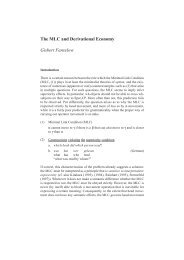Long distance object agreement, restructuring and anti ...
Long distance object agreement, restructuring and anti ...
Long distance object agreement, restructuring and anti ...
You also want an ePaper? Increase the reach of your titles
YUMPU automatically turns print PDFs into web optimized ePapers that Google loves.
Bobaljik <strong>and</strong> Wurmbr<strong>and</strong><br />
(17) When the embedded <strong>object</strong> agrees with the matrix v (<strong>and</strong> gets case in the<br />
matrix predicate), it has to be interpreted in the matrix predicate; it cannot take<br />
embedded scope.<br />
To test this prediction in Itelmen, we suggested contexts in which, for example, I was<br />
going out of my apartment <strong>and</strong> expected that it might rain. Therefore, I was supposed to<br />
close all the windows. In such a context, an example like (1)a, repeated here as (18)a, was<br />
judged acceptable, but with the additional comment from the consultant that as a result,<br />
all windows remained open. Example (18)b was presented in a similar context, <strong>and</strong> after<br />
judging the sentence acceptable, the consultants were asked whether this could be uttered<br />
felicitously if some windows had been closed, <strong>and</strong> only some forgotten. The sentence<br />
was clearly judged inappropriate for that scenario.<br />
(18) a. t’÷´ntxa÷c&e?n [ mi¬ okno÷?n sop÷es ]<br />
1SG-forget-3PL.OBJ [ all window-PL close-INF ]<br />
‘I forgot to close all the windows’ (S6:6-7)<br />
b. na k’÷´ntxa÷a?n=ni?n mi¬ okno÷?n sop÷es<br />
he PART-forget-TRANS.PL=CLITIC all window-PL close-INF<br />
‘He forgot to close all the windows’ (S6:2)<br />
As one independent control, we established that the universal qu<strong>anti</strong>fier mi¬ ‘all’ does<br />
enter into scope interactions <strong>and</strong> is not for example restricted to taking widest scope<br />
(however that might be achieved). The sentence pair in (19) establishes this. The<br />
continuation in (19)b was offered by the consultant as a clarification of the meaning of<br />
(19)a. Note that the clarification would have been a contradiction if the universal did not<br />
scope under negation in (19)a.<br />
(19) a. qa?m mi¬÷an÷e?nk n´nJc&÷i?n z´l÷aq i¬÷ne?n...<br />
NEG all-AUGM-PL.DAT fish-PL give-NEG AUX-3>3PL<br />
‘He didn’t give fish to everyone…’<br />
b. qola÷?nk i k’÷´ntxa÷an z´l÷es<br />
other-PL.DAT INTERJ PART-forget-TRANS give-INF<br />
‘To other people, he forgot to give (fish).’ (S6:13)<br />
i.e.: ‘He didn’t give fish to everyone, (to some people, he gave fish) but to<br />
others, he forgot.’<br />
It should be pointed out at this point that the Itelmen results should be considered<br />
preliminary. Testing these with more speakers may, sadly, prove impossible (though the<br />
test should be replicable in other languages with <strong>restructuring</strong> LDA). Results with the<br />
LDA verb -utu- ‘be.unable’ (e.g., Pasha can’t pick up all of his toys) proved inconclusive<br />
for irrelevant reasons (such as confusions regarding distributive <strong>and</strong> collective readings).<br />
What is fair to say is that all of the clear judgments we were able to obtain were<br />
consistently for wide scope of the universal over the matrix verb in LDA contexts. Our<br />
optimism that this is indeed systematic is supported by the fact that this interpretation

















